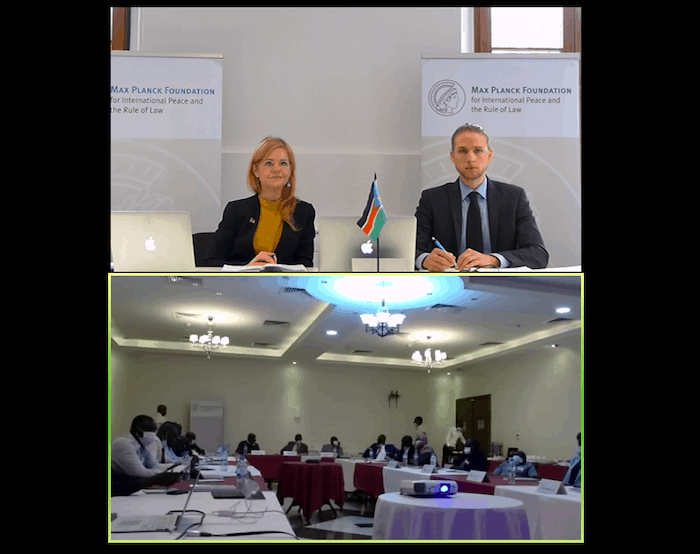Third training on the protection and application of fundamental rights in the Constitution
In continuation of its series of online workshops with the Judiciary of South Sudan, the Max Planck Foundation conducted the third training on “The Protection and Application of Fundamental Rights in the Constitution”. The workshop, which took place on 24 and 25 November 2020, was also the fifth workshop within the framework of the project Supporting Institutional Access to Justice in South Sudan funded by the German Federal Foreign Office. It aimed at introducing Judges of the High Courts and County Courts of South Sudan to the topic of fundamental rights and their protection and application at international, regional, and domestic levels.
The workshop was facilitated remotely, with Foundation researchers in Heidelberg, Germany, and fifteen judges of the Lower Courts participating from Juba, South Sudan. The combination of pre-recorded thematic reviews and subsequent live discussions adopted already in the first two trainings of this online workshop series was utilised again and allowed for interactive sessions.
The workshop was officially opened by the Chief Justice of South Sudan, HE Justice Chan Reec Madut, the German Ambassador to South Sudan, Amb. Manuel Müller, and the Director of Training at the Judiciary, Justice Dr Benjamin Baak Deng.
A range of topics with regard to human rights and fundamental rights were discussed. Starting with an overview of the history and development of human rights, the workshop dealt with the constitutional protection of fundamental rights and examined protections under the South Sudanese Bill of Rights, before it addressed procedural considerations in the application of the Bill of Rights.
During the live discussions, the participants and the Foundation’s staff members elaborated the meaning and significance of ius cogens norms, the limitation of and derogation from fundamental rights, as well as the jurisdiction of the Constitutional Panel of the South Sudan Supreme Court. When it came to the analysis of the South Sudanese Bill of Rights, the right to personal liberty, the freedom of assembly, the right to education as well as women’s and children’s rights were discussed in detail, considering the respective provisions within the Transitional Constitution of South Sudan, international legal instruments and comparative case law.
The final case study session was held as a full live discussion and engaged the participants with practical scenarios on how to handle cases related to human rights before the Lower Courts. The workshop was officially closed by the Director of Training at the Judiciary of South Sudan who commended the format of this virtual workshop and thanked the Foundation and the German Federal Foreign Office for their continued support to the Judiciary of South Sudan.

